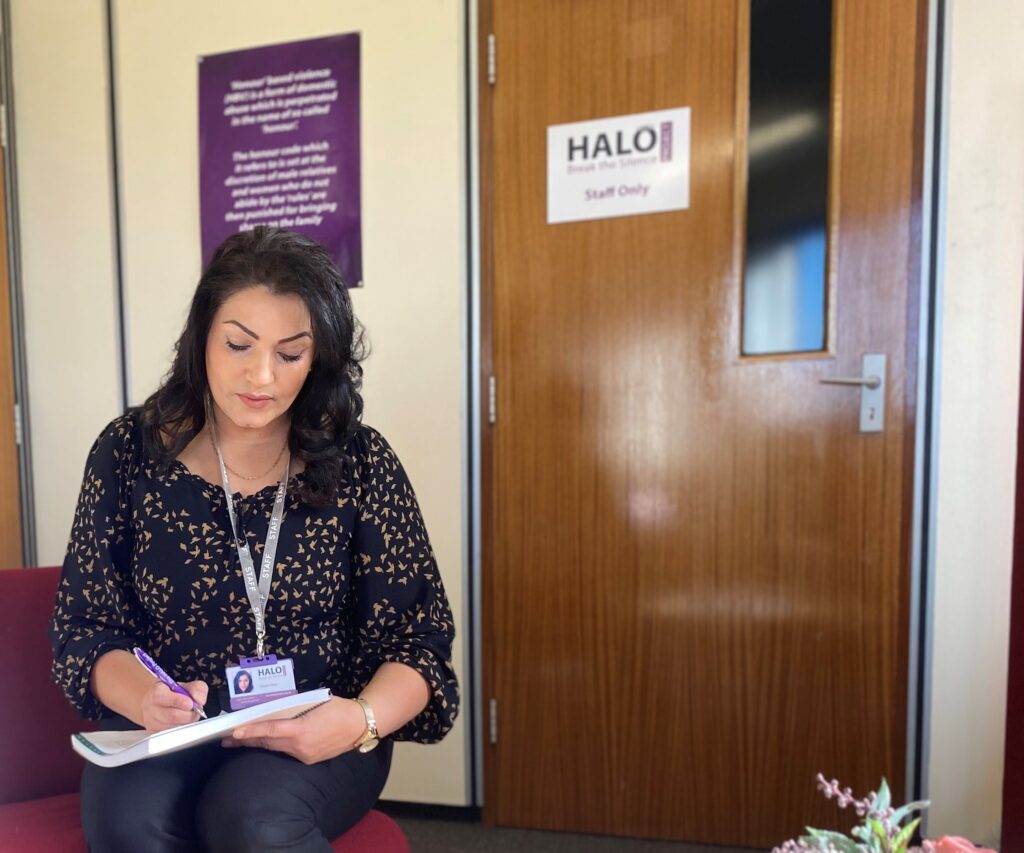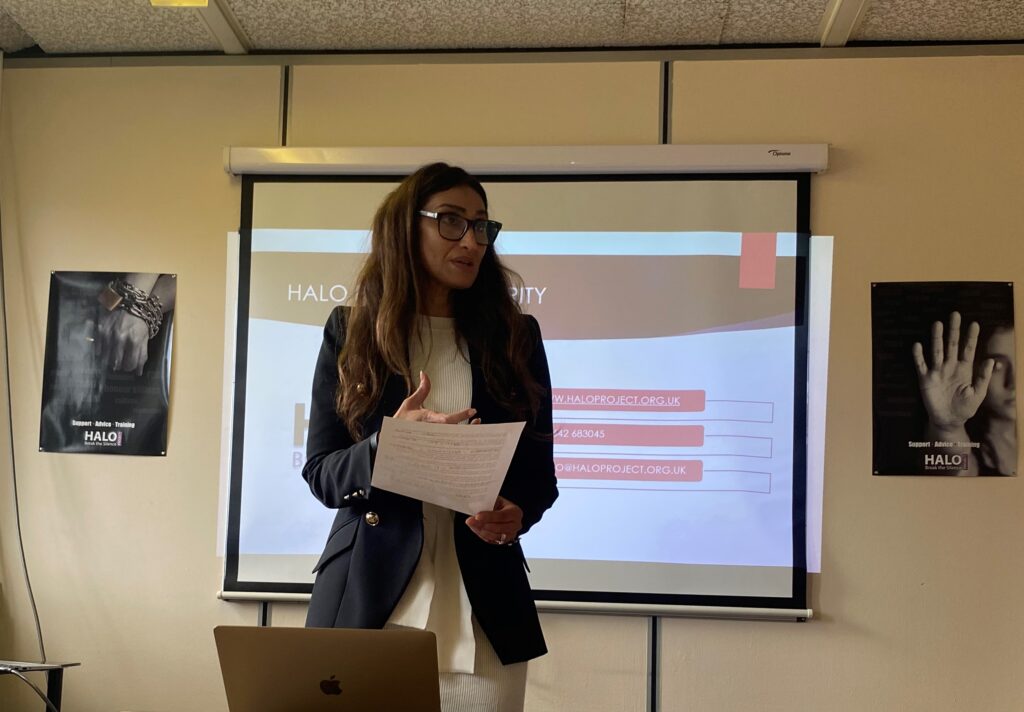
By Zoe Crowther
The pandemic has revealed the devastating and real extent of honour-based violence in the UK, according to the founder of a leading charity which supports survivors.
Yasmin Khan, founder of the Middlesbrough-based Halo Project, a charity which supports honour-based abuse (HBA) survivors, believes the Covid-19 pandemic has led to a surge in survivors coming forward after two years of being unable to seek help.
The National Lottery-funded charity has identified huge gaps in the reporting and understanding of HBA, which Khan says is even more prevalent than official figures suggest: the Home Office has only started collecting data from police forces on HBA offences since April 2019.
In the lead up to the National Day of Remembrance for Honour Based Violence (July 14th), the leading National Lottery funded charity, Halo Project, is now calling on victims to spot the signs, report the crime and get the right support they need.
Khan said: “We are seeing a tsunami of victims coming forward who have been extremely traumatised.
“This pandemic has exposed such inequalities and gaps in services, and a lot of staff are burnt out.”
There is no specific offence of ‘honour’-based violence. However, the Crown Prosecution Service describes ‘honour’-based violence as an incident or crime “which has, or may have, been committed to protect or defend the ‘honour’ of the family and or the community.”
Honour-based abuse, although not defined in law, refers to where the concept of ‘honour’ has been used to carry out an offence, such as female genital mutilation (FGM), forced marriage, or honour killings.
Honour-based abuse survivor S* sought help from the Halo Project last year. Having been abused and controlled by her husband, the charity put together a safety plan and provided her with a refuge.
“They gave me a plan B and they gave someone I can share everything with,” she said.
“A caseworker used to sit and listen to me for a long time and it really made a difference.
“People should not be scared to come forward because of their culture. People should know where to ask for help.”
Honour Based Abuse is misunderstood and underreported, meaning that hundreds of victims are not being helped and perpetrators are escaping justice.
Based in North East England, the Halo Project has directly offered support to more than 3,000 HBA survivors since 2011, by providing services such as emergency accommodation, language support, legal advocacy, and a national helpline.
Many survivors they work with are aged between 16 and 24.
“Organisations like ours are so important as the steppingstone for survivors to get the services that they deserve,” Khan said.
“Everyone who comes through our doors is uniquely different; we can’t give them a one size fits all service.
“It’s about tailoring our services to meet their needs and we’ve become real experts in the field, not only for victims, but also for public bodies who need our insight to improve.”
The Halo Project has been involved in a systematic review of police forces in England and Wales, which will result in a published report later this year.
Many HBA survivors feel there is no way out and Khan said the charity has worked with individuals who have tried to take their own life as a result: “Survivors have told us: ‘You’ve saved my life. You’ve turned my life around.’
“When they come to our service, that might be their only chance. And we’ve got to get it right the first time.”
The Halo Project’s long-term aim is to build a ‘zero-tolerance’ approach to honour-based abuse and ‘eradicate’ gender-based violence.
Despite lockdown making face-to-face support difficult, the Halo Project maintained services for survivors via video calls throughout.
N*, a survivor of domestic abuse, was supported by the Halo Project last year to find legal representation and secure a divorce with her abusive husband, who is no longer allowed to come into contact with her or her children.
“My mental health was not good, so their help was very, very important,” she said. “It was my start for a new life.”
She urges other women to not wait for their abusive partners to change, saying: “I waited 13 years and nothing happened. The help I received from Halo was my start, and they will be in my mind all my life.
“Now, everything is okay and I have plans for my future and my children.”
Khan said that funding from The National Lottery has enabled the Halo Project to develop its services further.
She explained: “The National Lottery has been absolutely amazing in understanding our project needs and developing them with us, and really meeting the gaps in services.
“This funding has acted like a safe passage for other funders to come on board, because it shows we are credible and have a history of external funding. That has been a real positive for us.”
Journalist and broadcaster Samira Ahmed, who has long been a supporter of projects tackling HBA, said: “Throughout my career, I’ve always had a special interest and concern in violence against women, particularly honour-based violence against women.
“Honour-based violence has always been there, but we didn’t always call it honour-based violence. The word ‘honour’ is controversial – some people feel it shouldn’t ever be used in the context of violence against women – but it struck me that the problem was never going away, that there were always accusations of racism if people tried to talk about it, and women were being silenced.”
Mrs Ahmed acknowledged HBA continues to be underreported and underacknowledged by the wider public, partly due to these difficulties associated with labelling and discussing it.
She added: “I’ve been really struck when I’ve gone into some communities, and spent time talking to people, police, social workers, women’s groups, about how much pressure there is to not talk about honour-based violence, because somehow it tars a whole community and that it suits racists to talk about it.
“That’s been the real challenge as a journalist: finding that balance between being scrupulously fair and not feeding racism, but also just calling a crime a crime.”
To find out more about the Halo Project and the work they do, visit https://www.haloproject.org.uk/
National Lottery players raise more than £30million a week for good causes, making projects such as these possible. Find out how your numbers make amazing happen at: www.lotterygoodcauses.org.uk
*Name anonymised to protect the identity of the survivor







